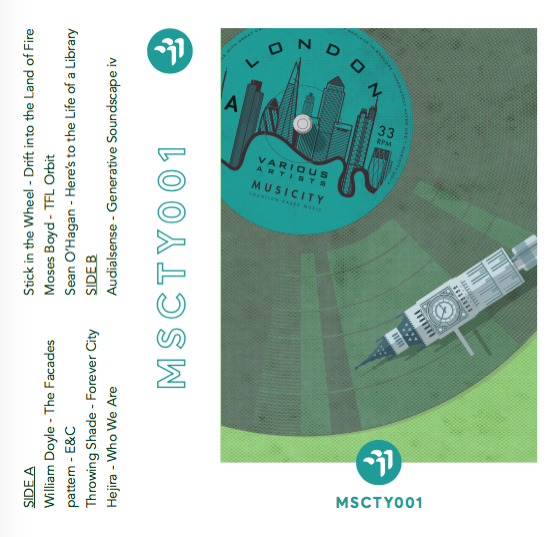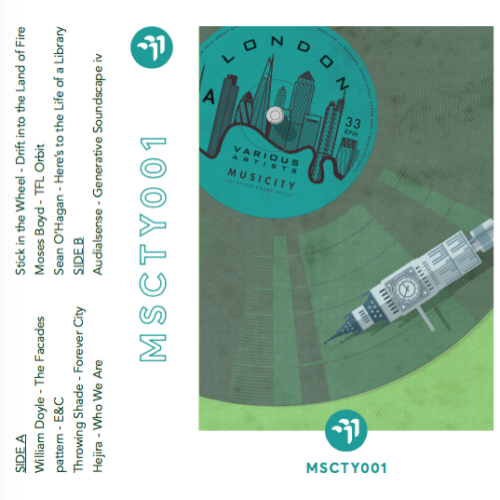Musicity, the sound art project set up by BBC Radio’s Nick Luscombe, has a tape out. This is a departure from normal Musicity practice. Nick (often working collaboratively) usually records and performs a place from scratch, in situ: past projects took him to Japan, Estonia and The Netherlands. I recently saw him in action with Steve Hellier at a residency in WORM, Rotterdam, a three-day stay that involved thumping a shipping container to within an inch of its life and making psychedelic chemtrails from the clicking noise you get on Dutch traffic lights when it’s safe to cross the road. But (inkeeping with Nick’s mercurial nature) he’s decided to do something else. MSCTY001 is the first release in a series where musicians and recording artists are invited to compose tracks in response to buildings and locations in cities around the world. This one – probably the result of Luscombe thumbing through his contacts book – celebrates London.
At first I thought, well, a nice idea of course, and doubtless expertly curated, but what’s going to be so special about this release, outside of very 21st-century diversions like listening in situ (the tracks are geotagged). I had a fear that this would be the latest in a long line of worthy psychogeographic records. This last decade has seen so many of these; from bucolic reinventions of folk memories to ingenious appraisals of underground rivers, woods or (in one case) a metal gate. Most are good, some brilliant, but some are downright pretentious, often lazy and over-personal to boot. And even given the current trend for delineating and discussing space in the arts and academia, evoking London’s mysterious nature through music is as old as the hills. We can cite Vaughan Williams, Geordie Handel, or those two headbangers, Flanagan and Allen just for starters. What would we get from it? Luckily MSCTY001 is an inclusive, eclectic and inquisitive record, and a very very moreish listen. And weirdly, given the record’s (oddly) comforting narrative arc, it reminds this old buffer of the brilliant Trance Europe Express and Trance Atlantic compilation LPs from the early 90s – brilliant and sprawling collections of dance, ambient, and soundscape that somehow held together and captured a form of that era’s zeitgeist. A small triumph, in fact.
Every track on MSCTY001 displays a sparkling freshness and complete lack of pomposity. We can note the essential individuality of each track; each one forces a reappraisal on the listener, simply (one suspects) by picking up on the curiosity of the original artist towards their subject. Consequently nothing ever feels forced. A prime example is the way Sean O’Hagan’s contribution, ‘Here’s To The Life of A Library’, turns up to act as a counterpoint to the spacey demonstrations of the Moses Boyd track that went before. ‘Here’s To The Life of A Library’ is like a lost Studio G recording trying to find its way back to 1972 after a mad night on the tiles with Stereolab. Or an offcut from the great lost Family Of God LP. Regardless, it serves its purpose here by being utterly charming and completely convincing, and brings the tape to a refreshing end.
What also helps (immensely) is the way opening track ‘The Facades’ (a typically soulful and atmospheric piece from from William Doyle) settles everything down. Doyle’s figurative soul-pop lays down a subliminal message: yes we are going to listen to some extremely inventive and intelligent music throughout, but (we can assure you) there will be no pretentious, cockswinging psychogeography balls. Doyle’s subject is The Shard, a building that Doyle sees as a “modern hymn to a modern temple […] the emblem of 21st-century design and modern capitalism”. Taking him at his word, it is a devotional piece with (albeit on a way smaller scale) something of the worshipful tone of, say, ‘The Window of Appearances’ in Philip Glass’s opera, Akhnaten. It’s in the swirling, dreamy patterns of the music; the sort of modernist hymn you could imagine being penned for Milton Keynes back in the 70s. But one can’t help but think that Doyle’s explanation is ambiguous. As ever his music encourages the listener to explore what feel like vast emotional hinterlands, and this invitation on his part is the perfect conduit for exploring the rest of the LP.
Elsewhere we get small pinpricks of a place’s essence and wider, transnational memories. We get hymns to specific buildings and soundscapes. But, as noted earlier, nothing feels as if it’s nodding to this past decade’s vogue for such releases. The closest we come to what we could have expected for such an LP comes with Hejira’s ghostly collage, ‘Who We Are’, which employs the Victorian Time and Talents Settlement on Bermondsey Street and The Old Mortuary in Rotherhithe. It’s a remarkable piece of memory work, acting almost as a freeform intermezzo for the album. It also reminds this listener of tiny fragments of all sorts of fab stuff; the waves in Roy Budd’s Get Carter soundtrack, Matana Roberts’s wild and dreamy soundscapes and the ghostly elements in John Cale’s ‘A Dream’ on Songs For Drella. The powerful dirge that follows, ‘Drift Into the Land of Fire’ (courtesy of Stick In The Wheel and inspired in part by Rotherhithe’s Finnish church) has a suitably Janus-like nature. This is an ages-old city, built on the talents and good brought from many lands. And its transitory nature, created in large part by the river Thames, is expertly captured here. The hypnotic feel of change and trade is further emphasised with patten’s quirky ode to Elephant & Castle’s condemned Shopping Centre, (something that would easily fit on a Moebius and Plank record) the brilliantly psyched-out ode to Canada Water Bus Station, Moses Boyd’s ‘TFL Orbit’ and the dreamy soundscape conjured up by Throwing Shade in celebration of Borough Market. A sublime sense of space and looseness invades all these tracks and in turn make MSCTY001 a remarkably approachable, easy album to negotiate.
Sometimes, you just know that something is magic after a couple of listens. And this tape has the aura of something special; an album that lives outside its allocated space in the scheme of things. If I had to be hyper critical, MSCTY001 misses out being an epic release by the nature of its being a track or two light. Nevertheless, it is a perfect introduction to a genre and (at times) a fine weirdo pop record to boot.



